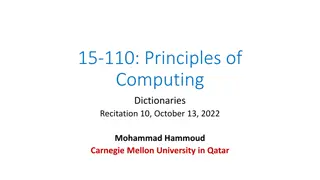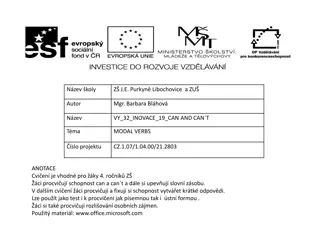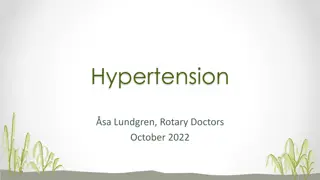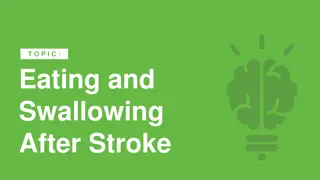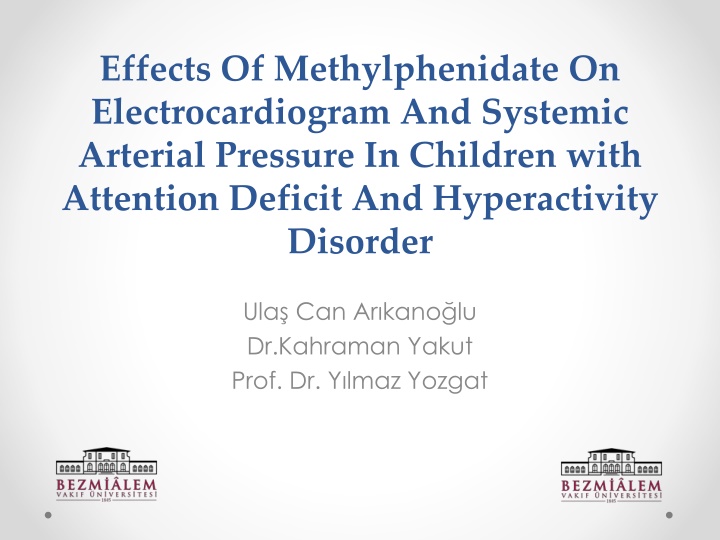
Effects of Methylphenidate on Electrocardiogram & Arterial Pressure in Children with ADHD
Investigating the effects of methylphenidate on electrocardiogram & systemic arterial pressure in children with ADHD, this study analyzed data from pediatric patients receiving MPH treatment. Results showed changes in blood pressure but no significant impact on QTc interval.
Download Presentation

Please find below an Image/Link to download the presentation.
The content on the website is provided AS IS for your information and personal use only. It may not be sold, licensed, or shared on other websites without obtaining consent from the author. If you encounter any issues during the download, it is possible that the publisher has removed the file from their server.
You are allowed to download the files provided on this website for personal or commercial use, subject to the condition that they are used lawfully. All files are the property of their respective owners.
The content on the website is provided AS IS for your information and personal use only. It may not be sold, licensed, or shared on other websites without obtaining consent from the author.
E N D
Presentation Transcript
Effects Of Methylphenidate On Electrocardiogram And Systemic Arterial Pressure In Children with Attention Deficit And Hyperactivity Disorder Ula Can Ar kano lu Dr.Kahraman Yakut Prof. Dr. Y lmaz Yozgat
INTRODUCTION Attention deficit and hyperactivity disorder (ADHD), which is characterized by developmentally inappropriate levels of attention, hyperactivity, and impulsivity, is one of the most common psychiatric disorders in childhood, and is considered the most common neurodevelopmental disorder. Currently, ADHD diagnosis is defined according to DSM-V diagnostic criteria specified by the American Psychiatric Association (APA).
ADHD treatment aims to improve the child's behavioral, social and cognitive functions. Most drugs used for ADHD are thought to be primarily effective in catecholamine pathways. Accordingly, the most commonly used pharmacological agent in treatment is methylphenidate (MPH). The effects of methylphenidate on the heart are controversial. It has been reported that these drugs prolong the corrected QT (QTc) time and trigger polymorphic ventricular tachycardias, leading to sudden cardiac death. However, it has been reported that prolonged release formulations of psychostimulants cause significant changes in systemic arterial pressure and heart rate. In our study, we aimed to investigate the effects on QTc interval and systemic blood pressure in patients diagnosed with ADHD and responded to methylphenidate treatment according to DSM-V diagnostic criteria.
METHOD In our study, physical examination and electrocardiography findings of 55 pediatric patients who applied to our pediatric cardiology outpatient clinic between September 2019 and December 2020 to start MPH treatment with a diagnosis of ADHD and who continued the treatment and received a positive response during this period were examined. 32.7% of 55 patients aged between 4 and 17 (mean: 9.11; sd: 3.387) were female and 67.3% were male. Patients who were not eligible for MPH therapy were excluded from the study. Systemic arterial pressure findings before the initiation of MPH treatment and in the 6th month of treatment and QTc values in electrocardiography were evaluated retrospectively. IBM SPSS V23.0 package program was used for data analysis. In our study, standard amplitude and speed (25mm / sec) and 12-channel ECG were used and measurements were made manually. Systolic and diastolic blood pressures were measured with a mercury sphygmomanometer
RESULTS Paired t test and Pearson correlation were used for initial and post-treatment comparison, statistical significance was accepted as p <0.05. When the basal and 6th month control values of 55 patients were compared, the pre-treatment systolic blood pressure values increased from 105.56 12.581 to 108.20 7.148 and there was a moderate correlation (Pearson correlation coefficient: 0.589) between the measured values, but it was not statistically significant (p = 0.06 ). While pre-treatment diastolic blood pressure values increased from 67.36 11.056 to 69.45 7.010, there was a moderate correlation (Pearson correlation coefficient: 0.596) between the measured values, but it was not statistically significant (p = 0.087). When the corrected QT values were examined, the values that were 0.401 0.02 before the treatment increased to 0.407 0.01 after the treatment, although there was a moderate correlation (Pearson correlation coefficient: 0.513), but it was not statistically significant. (p = 0.091).
DISCUSSION In the light of the data we have, although MPH treatment causes an increase in systemic arterial pressure and QTc values in our patients with ADHD, this increase is not at a level that requires the cessation of drug therapy. However, there is nothing to prevent the initiation of MPH therapy in any of the patients we included in our study. Therefore, although the parameters we examined were not statistically significant, the slight increase in values still necessitates routine cardiac examination and electrocardiography examinations in terms of possible side effects before MPH treatment.
REFERENCES 1. Zang Y. Impact of physical exercise on children with attention deficit hyperactivity disorders : Evidence through a meta-analysis. Medicine (Baltimore) 2019;98:17980. 2. Polanczyk G, de Lima MS, Horta BL, Biederman J, Rohde LA. The worldwide prevalence of ADHD: a systematic review and metaregression analysis. Am J Psychiatry 2007;164:942-8. 3. Faraone SV, Biederman J, Mick E. The age-dependent decline of attention deficit hyperactivity disorder: a meta-analysis of follow-up studies. Psychol Med 2006;36:159-65. 4. Diagnostic and Statistical Manual of Mental Disorders: DSM-5. American Psychiatric Publishing, 2013. 5. T rkmeno lu YE , Esedova C , Akpinar M , Uysal T , rdem A . Effects of medications on ventricular repolarization in children with attention deficit hyperactivity disorder. Int Clin Psychopharmacol 2020;35:109-112. 6. Arnsten AF, Li BM. Neurobiology of executive functions: catecholamine influences on prefrontal cortical functions. BiolPsychiatry 20051;57:1377-84. 7. van Noord C, Sturkenboom MC, Straus SM, Witteman JC, Stricker BH. Non-cardiovascular drugs that inhibit hERG-encoded potassium channels and risk of sudden cardiac death. Heart 2011;97:215-20. 8. Gould MS, Walsh BT, Munfakh JL, Kleinman M, Duan N, Olfson M, Greenhill L, Cooper T. Sudden death and use of stimulant medications in youths. Am J Psychiatry 2009;166:992-1001. 9. Hammerness P, Wilens T, Mick E, Spencer T, Doyle R, McCreary M, et al. Cardiovascular effects of longer-term, high-dose OROS methylphenidate in adolescents with attention deficit hyperactivity disorder. JPediatr 2009.;155:84-9. 10. Ginsberg, Y., & Lindefors, N. (2012). Methylphenidate treatment of adult male prison inmates with attention-deficit hyperactivity disorder: randomised double-blind placebo-controlled trial with open-label extension. British Journal of Psychiatry, 200(1), 68 73. https://doi.org/10.1192/bjp.bp.111.092940













